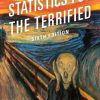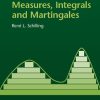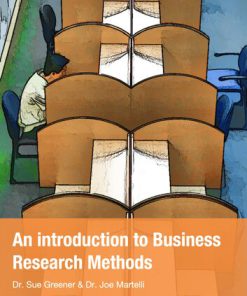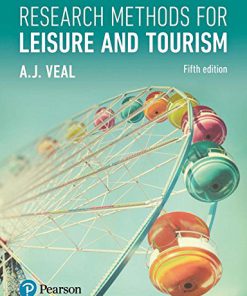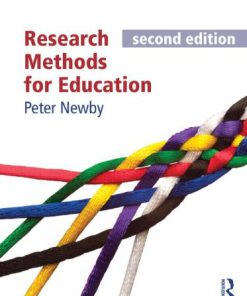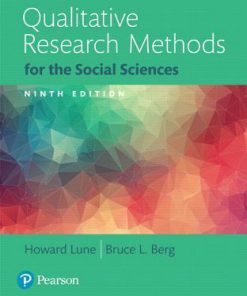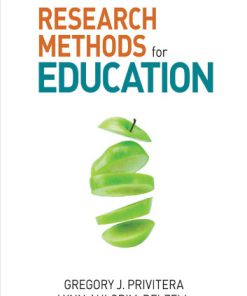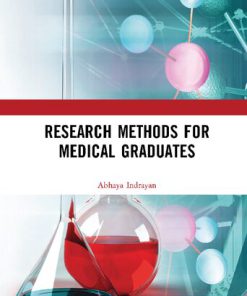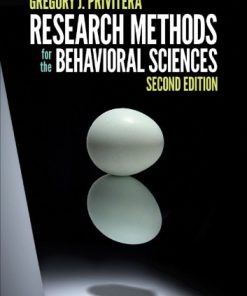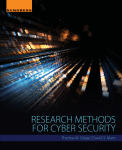Research methods for postgraduates 3rd edition by Tony Greenfield, Sue Greener ISBN 1118341465 9781118341469
$50.00 Original price was: $50.00.$25.00Current price is: $25.00.
Research methods for postgraduates 3rd edition by Tony Greenfield, Sue Greener – Ebook PDF Instant Download/Delivery: 1118341465, 978-1118341469
Full download Research methods for postgraduates 3rd Edition after payment
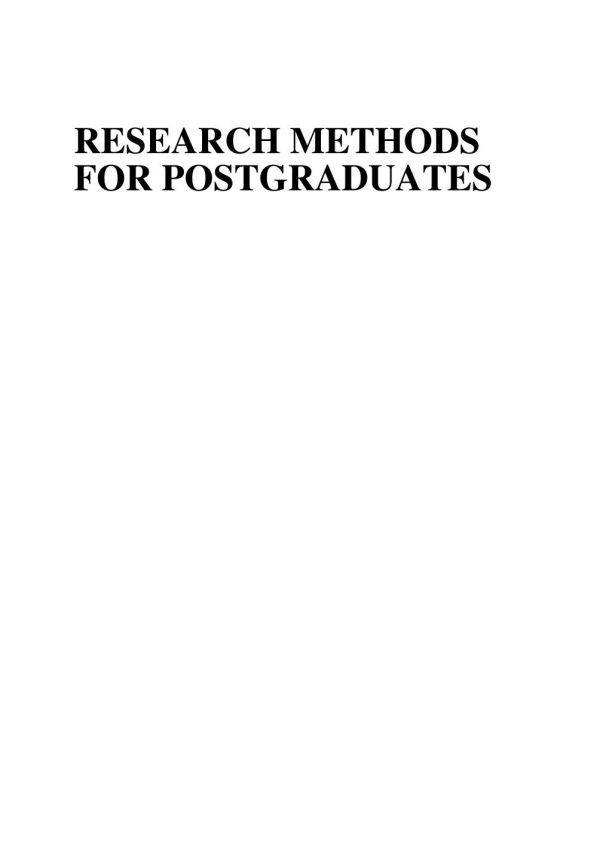
Product details:
ISBN 10: 1118341465
ISBN 13: 978-1118341469
Author: Tony Greenfield, Sue Greener
An indispensable reference for postgraduates, providing up to date guidance in all subject areas
Methods for Postgraduates brings together guidance for postgraduate students on how to organise, plan and do research from an interdisciplinary perspective. In this new edition, the already wide-ranging coverage is enhanced by the addition of new chapters on social media, evaluating the research process, Kansei engineering and medical research reporting. The extensive updates also provide the latest guidance on issues relevant to postgraduates in all subject areas, from writing a proposal and securing research funds, to data analysis and the presentation of research, through to intellectual property protection and career opportunities.
This thoroughly revised new edition provides:
- Clear and concise advice from distinguished international researchers on how to plan, organise and conduct research.
- New chapters explore social media in research, evaluate the research process, Kansei engineering and discuss the reporting of medical research.
- Check lists and diagrams throughout.
Praise for the second edition:
“… the most useful book any new postgraduate could ever buy.” (New Scientist)
“The book certainly merits its acceptance as essential reading for postgraduates and will be valuable to anyone associated in any way with research or with presentation of technical or scientific information of any kind.”(Robotica)
Like its predecessors, the third edition of Research Methods for Postgraduates is accessible and comprehensive, and is a must-read for any postgraduate student.
Research methods for postgraduates 3rd Table of contents:
Part I: First Steps
Chapter 1: A View of Research
-
Introduction
-
Contents
-
Creativity
Chapter 2: The Research Journey: Four Steps to Success
-
Part 1: Reviewing the Field
-
Part 2: Theory Building
-
Part 3: Theory Testing
-
Part 4: Reflection and Integration
-
Summary and conclusions
-
References
-
Notes
Chapter 3: Managing Your Doctorate
-
Introduction
-
Approaching and Starting Your Doctorate
-
Planning Your Research Project
-
Organising Your Research
-
Managing Your Research
-
Managing Your Relationship with Your Supervisory Team
-
Managing Yourself
-
Completing Your Submission
-
Preparing for Your Viva
-
On the Day
-
Disseminating Your Findings
-
Conclusions
-
References
-
Note
Chapter 4: Documenting Your Work
-
Why Document?
-
Documenting Data
-
How to Document?
-
In Conclusion
-
References
Chapter 5: Ethics of Research
-
Introduction
-
Background
-
Codes of Conduct
-
Politics
-
Cutting Corners
-
Fraud
-
References
Chapter 6: Plagiarism
-
Some Examples
-
Stopping Plagiarism
-
Conclusion
Chapter 7: Critically Reviewing Your Own Research
-
Introduction
-
A Checklist from the Experts in Reviewing Research
-
The Issue of Criticality
-
Conclusions
-
Appendix
-
Note
Part II: Support
Chapter 8: Research Proposals for Funding
-
Introduction
-
Find a Suitable Funder
-
Plan Your Proposal
-
Write Your Proposal
-
How Much to Charge?
-
Checks before Submission
-
What Happens Next?
-
If You Are Unsuccessful
-
If You Are Successful
-
The Future
Chapter 9: Who Can Help?
-
Introduction
-
Supervisors
-
Attracting Ideas
-
Academic Sources of Help
-
Other Sources of Help
-
Summary
Chapter 10: Information and Library Services
-
Introduction
-
Know Your Librarian
-
Develop the Skills You Need
-
Tracking down Books
-
Journal Articles and Electronic Sources
-
Accessing Other Libraries
-
Studying at a Distance
-
Keep a Record of What You Have Done
-
Research Data Management
-
Conclusion
-
References
Chapter 11: Research Methods for Advanced Web Searching
-
Some Background
-
How It Works and How to Work It
-
Web Filtering
-
Finding the Academic Websites That Search Engines Cannot Find
-
Finding Journal Articles
-
Conclusions
-
List of Websites Referred to in the Text
-
References
Chapter 12: Searching in Unfamiliar Fields
-
A Strategy for Search
-
Searching in Unfamiliar Territory
-
Keywords
-
Conclusions
-
Appendix: Specimen Search Profile
-
References
Chapter 13: Sources of Population Statistics
-
Why Are Statistics about Populations So Important?
-
Populations and Classifications
-
Which Population Counts Would You Ideally Like for Your Project?
-
Which Organisations Produce and Supply Data?
-
What Are the Major Sources of Population Statistics?
-
Conclusions: Hunting Population Statistics
Chapter 14: An Introduction to Bibliometrics
-
Why a Chapter on Bibliometrics?
-
Introduction
-
The Definition of Bibliometrics
-
The History of Bibliometrics
-
Bibliometrics as a Research Field
-
Bibliometrics and Evaluation of Research
-
Bibliometrics Indicators
-
Conclusions
-
References
-
Notes
Chapter 15: Choosing and Using Software for Statistics
-
What Can You Afford?
-
What Sort of Person Are You?
-
Emphasising the Graphical
-
Taking Direct Command of Your Software
-
Going for the Best of Both Worlds
-
Special Cases
-
Suitability for Your Purpose
-
And Finally …
Chapter 16: Computer Support for Data Analysis
-
Introduction
-
Five Stages of Statistical Method
-
Confirmatory and Exploratory Analysis
-
Computing Resources
-
Standard Statistical Packages
-
Specialised Statistical Packages
-
Conclusion
-
References
Part III: Measurement and Experimentation
Chapter 17: Instrumentation in Experimentation
-
Introduction
-
Concept of Measurement
-
Measurement Systems: Basic Principles
-
Performance of Measurement Systems
-
Evaluation of Measurement Instrumentation
-
Discussion
-
Websites for Software and Hardware
-
Websites on Safety and Standards
-
References
Chapter 18: Randomised Trials
-
Introduction
-
Trial Design
-
Analysis
-
Interpretation of Results
-
References
Chapter 19: Laboratory and Industrial Experiments
-
Introduction
-
Principles of Experimental Design
-
References
Chapter 20: Experiments in Biological Sciences
-
Blocking
-
Treatment Structure
-
Other Types of Blocking Structure
-
Assumptions of the Analysis
-
Transformations
-
Generalised Linear Models
-
Spatial Covariance Models
-
Repeated Measurements
-
Conclusion
-
References
Chapter 21: Survey Research
-
What Is a Survey?
-
Dimensions of Surveys
-
Questionnaire Design
-
Modes of Questionnaire Administration
-
Ethics
-
Practicalities
-
Pros and Cons of Each Method of Administration
-
References
-
Further Reading
Chapter 22: Theory and Practice of Qualitative Research
-
What Is Qualitative Research, and Why Use It?
-
Qualitative versus Quantitative Research
-
Typologies of Qualitative Research
-
Questioning-Driven Qualitative Research Methods
-
Observation-Driven Qualitative Research Methods
-
Software Support of Qualitative Research
-
Reliability and Validity of Qualitative Research
-
References
Chapter 23: Kansei Engineering
-
An Introduction to Kansei Engineering
-
A Model for Kansei Engineering Studies
-
An Example Using Printed Paper Sheets
-
References
Chapter 24: Principles of Sampling
-
Introduction
-
Why Sample?
-
Sample Design
-
Inference
-
Bias, Variance and Accuracy
-
Non-probability Sampling
-
Probability Sampling
-
Capture–Recapture Sampling
-
Adaptive Sampling
-
Sample Size
-
Weighting
-
Summary
-
References
Chapter 25: Sampling in Human Studies
-
Introduction
-
Important Considerations
-
Stratification
-
Sampling Frames
-
Sampling General Populations
-
Sampling Special Populations
-
Screening a General Population Sample
-
Weighting
-
References
Chapter 26: Interviewing
-
Introduction
-
The Case for and against Interviewing
-
Varieties of Interview
-
Internet Interviewing
-
Interview Questions
-
Interviewing as a Process
-
Upon Arrival
-
Recording Interviews
-
Analysing Interviews
-
Final Reflections upon Interviewing
-
Internet Resources
-
References
Chapter 27: Measurement Error
-
Introduction
-
Scales of Measurement
-
Four Researchers Who Need to Measure
-
How Good Are Their Measurements?
-
How Can We Best Describe the Performance of a Process?
-
Assessing a Measurement Process in Psychology
-
Assessing a Measurement Process in Engineering Research
-
A Procedure for Assessing Engineering Measurement Processes
-
A Procedure for Assessing Chemical Measurement Processes
-
Errors in Data Taken from Computer Files
-
Measurement Uncertainty
-
Summary
-
References
Part IV: Data Analysis
Chapter 28: Elementary Statistics
-
Introduction
-
Scales
-
Basic Measures
-
Simple Distributions
-
Estimating Parameters
-
Testing Hypotheses
-
Conclusion
-
References
-
Further Reading
Chapter 29: Further Statistical Methods
-
Introduction
-
Regression Analysis
-
Logistic Regression
-
Discriminant Analysis
-
Analysis of Variance
-
Other Methods
-
Time Series
-
Other Techniques
-
References
-
Further Reading
Chapter 30: Spreadsheets: A Few Tips
-
Introduction
-
Part One: Data Source
-
Part Two: Data Analysis
-
Reference
People also search for Research methods for postgraduates 3rd:
quantitative research methods
secondary research methods
research methods and statistics in psychology pdf
a level psychology research methods
alan bryman social research methods
Tags:
Tony Greenfield,Sue Greener,Research methods,postgraduates 3rd
You may also like…
Science (General) - Research & Development
Education Studies & Teaching - School Education & Teaching
Research Methods for Education 2nd Edition by Peter Newby ISBN 9780415735858 0415735858
Politics & Philosophy - Social Sciences
Politics & Philosophy
Qualitative research methods for the social sciences Ninth Edition Berg
Education Studies & Teaching - School Education & Teaching
Biology and other natural sciences
Research Methods for Medical Graduates 1st Edition Abhaya Indrayan
Relationships & Lifestyle - Psychological Self-Help
Research Methods for the Behavioral Sciences 2nd Edition Gregory J. Privitera


